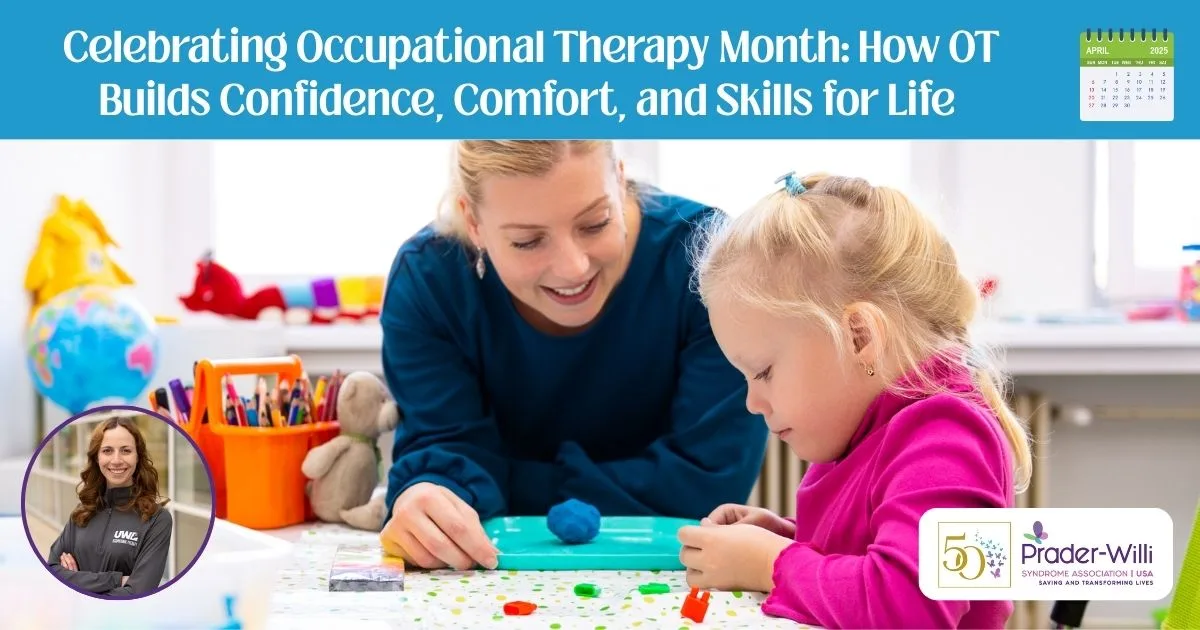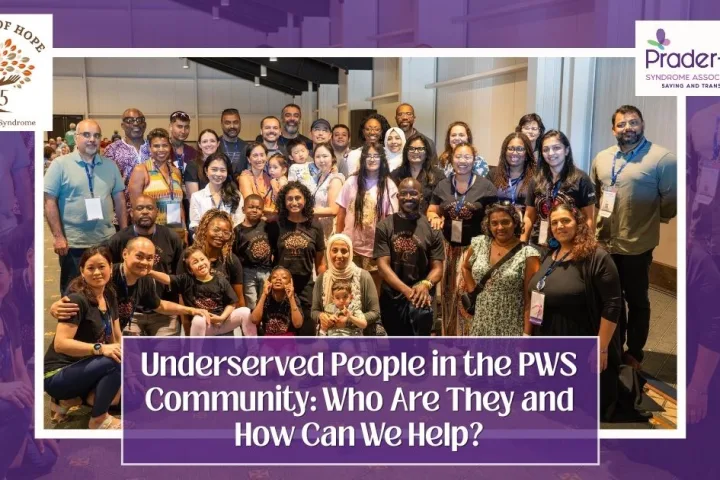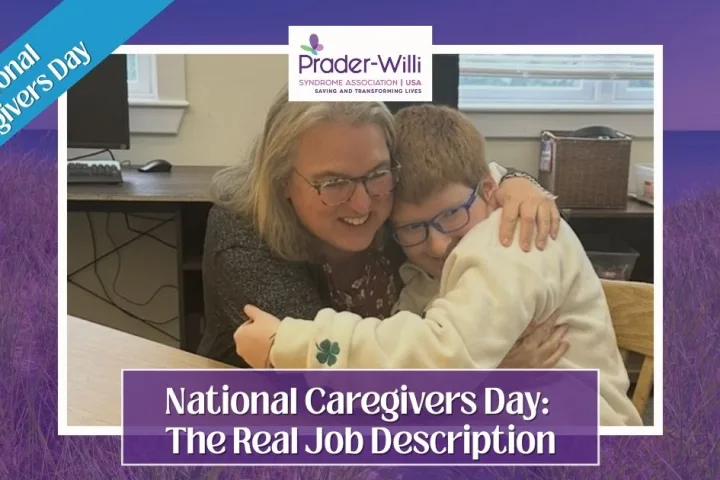Contributed by Kristi Larsen, MS, OTR/L, Occupational Therapist, Oakwood Village Rehab Services
April is National Occupational Therapy (OT) Month, a time to recognize the vital role occupational therapists and occupational therapy can play in helping people of all ages develop skills, confidence, and autonomy in daily life.
Kristi Larsen, MS, OTR/L, is a licensed and registered occupational therapist with Oakwood Village Skilled Rehab Facility in Madison, Wisconsin. While she currently works with older adults, her background also includes supporting pediatric patients with complex needs. Working as an OT, she has seen firsthand how occupational therapy can transform lives by building everyday skills that improve quality of life. Below, she shares her professional insight on several key topics that highlight the importance of occupational therapy for individuals living with complex diagnoses, including Prader-Willi syndrome.
A Holistic, Creative Approach to Function and Independence
What drew me to OT work was the opportunity to help people build practical, everyday skills that improve their quality of life. OT is such a hands-on, creative field, and I love the holistic approach we take, working on everything from motor skills to behavior and sensory regulation.
Sensory Integration: Building Comfort and Focus
Sensory integration refers to how the brain processes input from the senses, including sight, sound, touch, movement, and body awareness. When sensory processing is disrupted, it can lead to discomfort, anxiety, or challenges in everyday functioning.
Many individuals with complex diagnoses, like PWS, benefit from sensory-based strategies designed to help regulate the nervous system. These strategies are simple to implement at home, in school, or in therapeutic settings. Some common OT approaches include:
- Visual: Reducing glare or bright lights to support focus and visual comfort.
- Auditory: Using noise-canceling headphones to manage sensitivity to sounds.
- Tactile: Offering compression garments or textured tools to meet sensory needs.
- Vestibular: Incorporating gentle movement like rocking or jumping to regulate energy.
- Proprioceptive: Providing deep pressure through weighted blankets or massage to promote calm.
Therapists often work with families to create a personalized “sensory diet,” which is a plan of sensory activities that helps the individual stay regulated and ready to learn. Over time, some children begin to identify their own sensory needs and apply strategies independently.
The Importance of Early Intervention
Starting OT early, especially for children with complex diagnoses like PWS, can create a strong foundation for lifelong development. Early intervention supports coordination, communication, participation in routines, and sensory regulation at home and in educational environments.
These early skills lay the groundwork for success in academic, social, and possibly vocational settings. OT, alongside physical and speech therapy, is and should always be considered part of the standard of care for individuals with PWS.
Promoting Positive Behaviors and Social Skills
Another important focus of OT is behavior regulation. Therapists use tools from cognitive behavioral therapy (CBT) and other evidence-based practices to help individuals manage their thoughts, emotions, and actions. This might include establishing calming routines, creating schedules, or practicing social skills such as turn-taking and understanding body language.
For individuals living with PWS, who often experience heightened anxiety or resistance to change, these techniques can be especially valuable in building resilience and confidence during transitions.
Reducing Skin-Picking Behaviors Through Engagement
OT also addresses common repetitive behaviors such as skin picking, which is prevalent in the PWS community and often tied to anxiety or sensory seeking. Therapists use replacement activities to keep hands busy and provide alternative forms of stimulation. Some examples include:
- Fidget tools
- Arts and crafts
- Sticker boards
- Fine motor games and activities
These strategies not only help reduce harm but also support motor skill development and emotional regulation.
OT Support Across the Lifespan
Occupational therapy continues to benefit individuals with PWS well into adulthood. Adult-focused OT may include life skills training, support for independent living, and activities that encourage emotional expression and social connection.
Some adult activities that engage in fine motor skills and promote regulation can include diamond painting, Lego building, and sticker-by-number kits. These structured, calming projects can improve coordination and provide a strong sense of accomplishment.
Empowering People to Live Life to the Fullest
At its heart, occupational therapy is about empowerment. It’s about helping people participate more fully in the activities that give life meaning, whether that’s getting dressed, forming friendships, or simply feeling at ease in one’s body and environment.
For individuals living with PWS, OT provides essential support for developing a more independent lifestyle, confidence, and well-being.
Accessing Occupational Therapy Services
Families can begin occupational therapy by speaking with a pediatrician or primary care provider, who can write a referral for services. Therapy may be delivered in a variety of settings, including the home, school, and outpatient clinics.
Early support can make a lasting difference, and occupational therapy professionals are here to help every step of the way.
Share this!





 Perry A. Zirkel has written more than 1,500 publications on various aspects of school law, with an emphasis on legal issues in special education. He writes a regular column for NAESP’s Principal magazine and NASP’s Communiqué newsletter, and he did so previously for Phi Delta Kappan and Teaching Exceptional Children.
Perry A. Zirkel has written more than 1,500 publications on various aspects of school law, with an emphasis on legal issues in special education. He writes a regular column for NAESP’s Principal magazine and NASP’s Communiqué newsletter, and he did so previously for Phi Delta Kappan and Teaching Exceptional Children. Jennifer Bolander has been serving as a Special Education Specialist for PWSA (USA) since October of 2015. She is a graduate of John Carroll University and lives in Ohio with her husband Brad and daughters Kate (17), and Sophia (13) who was born with PWS.
Jennifer Bolander has been serving as a Special Education Specialist for PWSA (USA) since October of 2015. She is a graduate of John Carroll University and lives in Ohio with her husband Brad and daughters Kate (17), and Sophia (13) who was born with PWS. Dr. Amy McTighe is the PWS Program Manager and Inpatient Teacher at the Center for Prader-Willi Syndrome at the Children’s Institute of Pittsburgh. She graduated from Duquesne University receiving her Bachelor’s and Master’s degree in Education with a focus on elementary education, special education, and language arts.
Dr. Amy McTighe is the PWS Program Manager and Inpatient Teacher at the Center for Prader-Willi Syndrome at the Children’s Institute of Pittsburgh. She graduated from Duquesne University receiving her Bachelor’s and Master’s degree in Education with a focus on elementary education, special education, and language arts. Evan has worked with the Prader-Willi Syndrome Association (USA) since 2007 primarily as a Crisis Intervention and Family Support Counselor. Evans works with parents and schools to foster strong collaborative relationships and appropriate educational environments for students with PWS.
Evan has worked with the Prader-Willi Syndrome Association (USA) since 2007 primarily as a Crisis Intervention and Family Support Counselor. Evans works with parents and schools to foster strong collaborative relationships and appropriate educational environments for students with PWS. Staci Zimmerman works for Prader-Willi Syndrome Association of Colorado as an Individualized Education Program (IEP) consultant. Staci collaborates with the PWS multi-disciplinary clinic at the Children’s Hospital in Denver supporting families and school districts around the United States with their child’s Individual Educational Plan.
Staci Zimmerman works for Prader-Willi Syndrome Association of Colorado as an Individualized Education Program (IEP) consultant. Staci collaborates with the PWS multi-disciplinary clinic at the Children’s Hospital in Denver supporting families and school districts around the United States with their child’s Individual Educational Plan. Founded in 2001, SDLC is a non-profit legal services organization dedicated to protecting and advancing the legal rights of people with disabilities throughout the South. It partners with the Southern Poverty Law Center, Protection and Advocacy (P&A) programs, Legal Services Corporations (LSC) and disability organizations on major, systemic disability rights issues involving the Individuals with Disabilities Education Act (IDEA), Americans with Disabilities Act (ADA), and the federal Medicaid Act. Recently in November 2014, Jim retired.
Founded in 2001, SDLC is a non-profit legal services organization dedicated to protecting and advancing the legal rights of people with disabilities throughout the South. It partners with the Southern Poverty Law Center, Protection and Advocacy (P&A) programs, Legal Services Corporations (LSC) and disability organizations on major, systemic disability rights issues involving the Individuals with Disabilities Education Act (IDEA), Americans with Disabilities Act (ADA), and the federal Medicaid Act. Recently in November 2014, Jim retired.